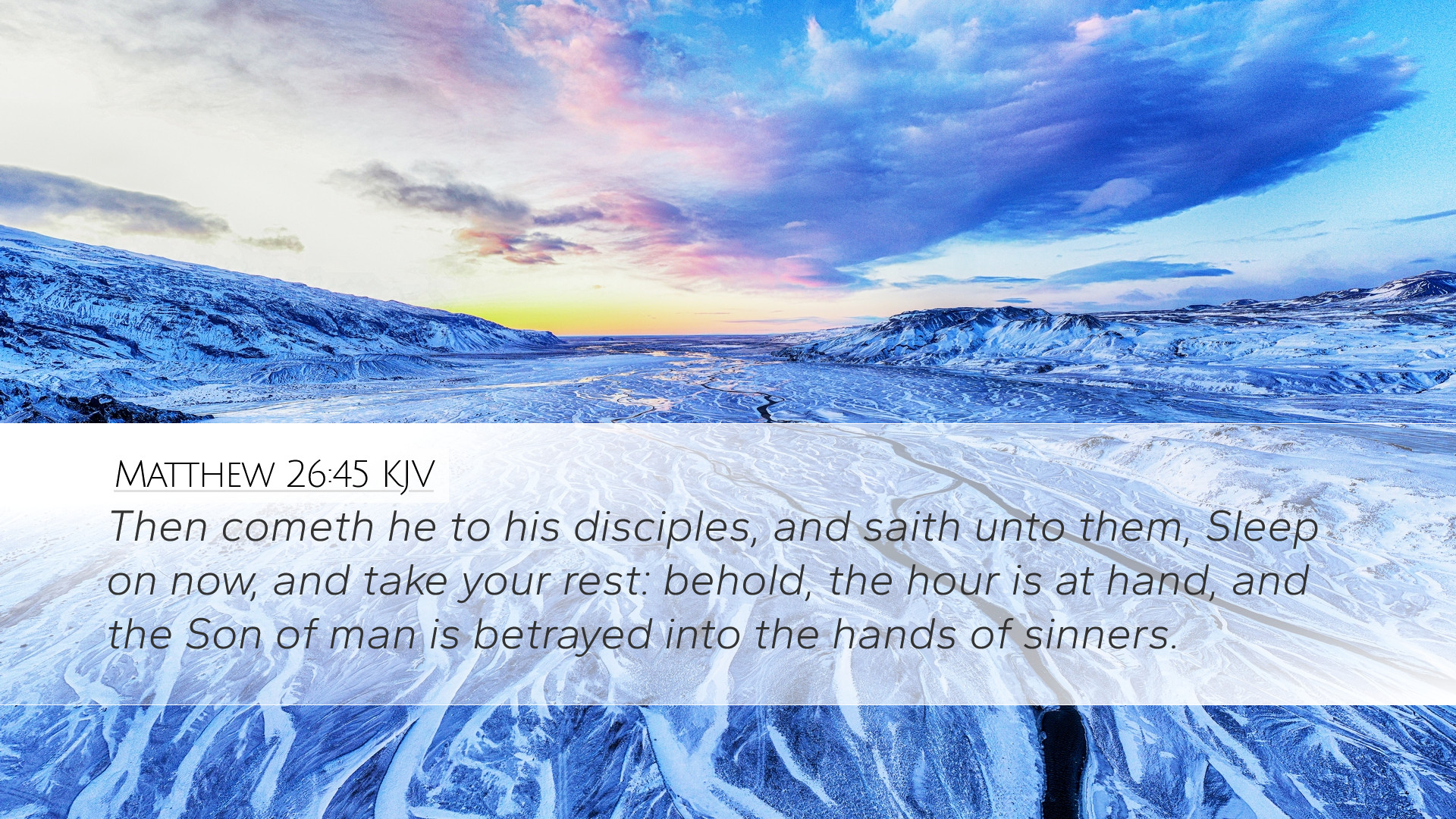Bible Commentary on Matthew 26:45
In this pivotal verse, Jesus addresses His disciples during the fervent moments in the Garden of Gethsemane. Matthew 26:45 states:
"Then He cometh to His disciples, and saith unto them, Sleep on now, and take your rest: behold, the hour is at hand, and the Son of man is betrayed into the hands of sinners."
Contextual Overview
This passage occurs during a crucial time in the narrative of the Gospels, specifically in the lead-up to Jesus' crucifixion. Understanding the depth of this moment requires an exploration of the psychological and spiritual struggle that Jesus faced, as well as the disciples' inability to stay awake and support Him.
Insights from Public Domain Commentaries
1. The Struggle in Gethsemane
Matthew Henry emphasizes that this scene showcases the human side of Christ. In His intense agony, He prays earnestly, knowing that His crucifixion is imminent. Henry notes that His request for His disciples to be vigilant highlights their slumber as a metaphor for spiritual dullness, which is a common theme throughout the Gospels.
2. The Dismissal of the Disciples’ Sleep
Albert Barnes remarks on the tone of Jesus' words: "Sleep on now, and take your rest." This phrase can be interpreted as both a compassionate acknowledgment of their weariness and a poignant reflection on their failure to remain alert. Barnes suggests that while the disciples might have thought their physical rest was adequate, Jesus understands the necessity of spiritual alertness, particularly as evil approaches.
3. The Significance of "the hour"
Adam Clarke provides a theological commentary on the phrase "the hour is at hand." It signifies the predetermined time for Jesus’ passion—the culmination of His earthly mission. Clarke asserts that the acknowledgment of this hour emphasizes God's sovereignty over the unfolding events and serves as a reminder of Jesus’ obedience to the divine plan, even amidst His personal struggle.
Theological Implications
This verse carries significant implications for understanding Jesus’ role as the suffering servant. The acknowledgment of His own impending betrayal while confronted with helplessness from His disciples serves to highlight the isolation that Jesus experienced prior to His crucifixion.
- The Nature of Discipleship: The failure of the disciples to remain vigilant challenges contemporary believers to confront their own moments of weakness and slumber in spiritual vigilance.
- The Divinity and Humanity of Christ: This passage evokes a profound exploration of the dual nature of Christ—fully divine yet fully human—demonstrating His deep emotional struggle intertwined with His divine purpose.
- Call to Watchfulness: The admonition to remain awake can be seen as a timeless call to believers to maintain spiritual vigilance amid trials and temptations.
Practical Applications for Ministry
In light of Matthew 26:45, pastors and church leaders can draw several lessons:
- Encouragement in Prayer: This text reminds leaders of the importance of prayer, particularly during crises, and can inspire congregations to engage in deeper prayer life.
- Awareness of Spiritual Warfare: Understanding the context of this moment invigorates the church to remain alert against spiritual lethargy and temptation, reinforcing the necessity of community support during difficult times.
- Empathy Towards Human Weakness: Recognizing the disciples’ struggle can cultivate compassion within the church body, fostering an environment where individuals can support one another in faith and fortitude.
Conclusion
Matthew 26:45 serves as a poignant reminder of the tension between the divine mission of Jesus and the reality of human weakness. By examining this verse through the lenses of historical and theological commentaries, one can gain a richer understanding of Jesus’ heart during His final hours leading to the cross. The insights provided encourage vigilance, deeper prayer, and an empathetic response to the frailty of both ourselves and our community in Christ.


